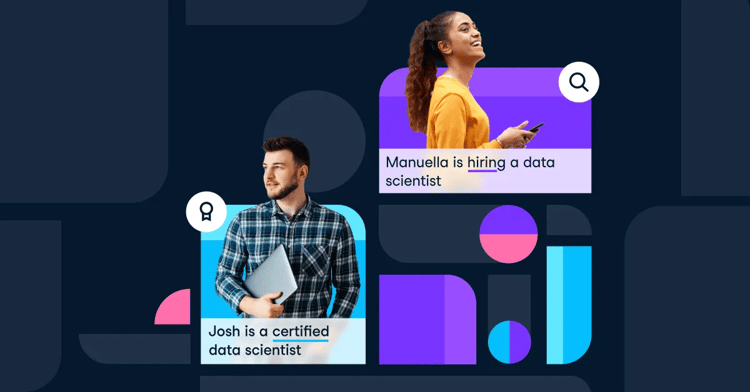Congratulations! You’ve taken the courses, you’ve done the timed assessments, you’ve written the case study, and you’ve completed the presentation. And now, before you on your screen, sits the email from DataCamp. “Congratulations, you’re now certified as a Professional Data Scientist by DataCamp!”
Here is what to do next!
1. Share your data science certificate on LinkedIn
DataCamp makes it very easy to share your data science certificate on LinkedIn—simply follow the links provided within your email. On your personal certification page, you can share your achievement by clicking on the social icon of your choice.
2. Celebrate
You did it! Getting a data science certification on DataCamp is a huge achievement, so give yourself some time doing whatever you love, be it a night on the town, or Netflix and your couch!
3. Get in touch with our career services team
Available to all certified data scientists, this can be thought of as a constant step. They can assist you in many of the subsequent steps on this list, including offering you resume and cover letter advice, and holding mock interviews.
4. Develop a broad data science career plan
Before you begin the search for your dream data science job, you should first consider the direction you want to take. Data science is used in many professions, including healthcare and finance. An understanding and appreciation of the underlying field you will be working in as a data scientist can help tremendously in matters such as communication with nontechnical colleagues (remember that part of the Certification process?) and feeling enthusiastic about your work.
5. Brush up your CV
Your CV is the main thing potential employers will read, and many will skim-read it. Have a convincing bio and/ or a small set of bullet points highlighting certain parts of your CV in a prominent place, and provide further details on your education, skills, and experience in clearly labeled sections.
6. Get good at writing cover letters
A good cover letter can be the difference between getting a job as a data scientist and not getting one. Cover letters should not be thought of as your CV reworded, but rather as an explanation for why this particular role would be ideal for you—and you, for it.
7. Get onto Glassdoor
Glassdoor is best-known for two things: interview questions and employee reviews. Regarding the first, knowing what kind of questions you will be asked in your data science interview can help to calm your nerves and prepare some sample answers. Employee reviews can give you an indication of what kind of work environment exists within the company you are applying to, and Glassdoor keeps these anonymized to provide greater authenticity. A word of caution, though: unsatisfied employees are more likely to leave bad reviews than satisfied ones, so bear this in mind.
8. Get a mock data science interview set up
To be able to sell yourself you need to be prepared for questions that may require more thought, or may be more surprising. Interviewing is a skill of its own, and the more practice you get in it, the better you will be. Getting it right the first time is extremely rare, so mock interviews are a great way to give yourself a practice round. Additionally, you will have a guarantee of detailed feedback afterward, which will help you identify any areas of improvement to your interview technique.
9. Build up a list of data science jobs you’d like to apply for
Devote some time to browsing through jobs you are sufficiently qualified for and listing them, whether through saving them to the platform you’re searching on (LinkedIn, for example, allows this) or adding them to a spreadsheet.
10. Apply for these data science jobs
This step varies from one listing to another. Every listing will require your contact details and a CV, at minimum. Some will also require a cover letter, or a completed application form. Make a good first impression at this stage, and you may get invited for a data science interview. Don’t take it too personally if you are rejected—the more practice you get in applications and interviews, the better you will get. It should also be said that data science skills are in high demand, so by getting certified you have already set yourself in good stead!
Good luck!
FAQ: ”What’s the difference between a data science certification and a statement of accomplishment?”
A data science certification is only available to learners who have gone through the Certification process, while a statement of accomplishment is provided to everyone who completes a course on DataCamp. As Certification does not provide answers or hints, and is timed, it is intended for people who have already completed a sizable number of courses.
